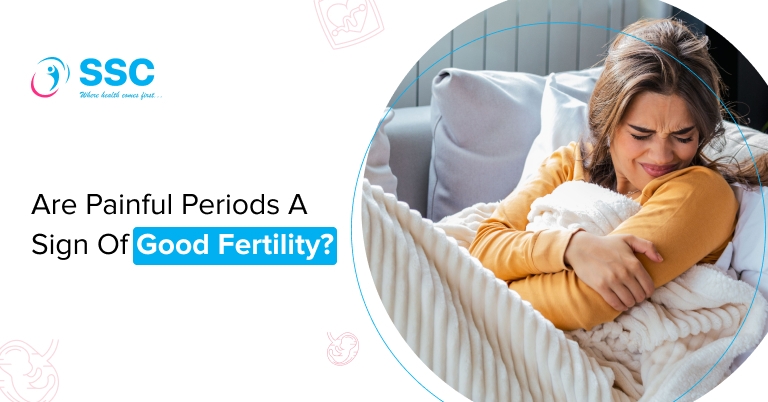Are Painful Periods A Sign Of Good Fertility?
Are uncomfortable periods normal? Does a healthy period have to hurt? The topics of painful periods and infertility have generated a lot of inquiries. People with period discomfort can experience it from their early teens through menopause. If your mother had period discomfort, you are more likely to too.
Most women experience discomfort when they are menstruating, particularly on the first day. Period cramps are a common occurrence for teenagers. If the soreness worsens as you age, though, there might be a deeper problem.
These pains are a sign of an issue with the womb or other pelvic organs, which could potentially make it more difficult for you to conceive.
We'll quickly review the reasons of painful periods, how they affect fertility, and several period pain management techniques in this post.
Relationship between Painful Periods And Pregnancy
Dysmenorrhea, often known as period pains, usually affects young women and girls in their teens when their periods start. Menstrual cramps are caused by a substance known as prostaglandin.
They facilitate the uterine lining's evacuation by contracting the uterine muscles. Two more roles for prostaglandins are to induce labor contractions and delivery.
Prostaglandin levels can cause strong contractions in the uterus, which can cut off oxygen to certain muscle regions and result in painful periods.
Period cramps brought on by prostaglandins' regular activity are known as primary dysmenorrhea, and they have no negative impact on fertility.
Period pains brought on by any illness or anomalies in the reproductive system that negatively impact the rate of conception are known as secondary dysmenorrhea.
Causes of Painful Periods
Endometriosis
The development of tissue outside the uterus termed endometrium, which resembles the lining of the uterus, is known as endometriosis. Tissues grow on the bladder, fallopian tubes, uterus, and ovaries in this painful illness.
Endometriosis affects up to 10% of women between the ages of 15 and 44. The endometrial tissue that is forming in these areas is not eliminated by the menstrual cycle, which results in inflammation, scarring, and excruciating cysts.
It is among the prevalent ailments associated with female infertility. Conditions involving mild to moderate endometriosis may only lead to transient infertility. With the use of endometrial tissue removal surgery, a woman may be able to conceive.
Adenomyosis
The process of adenomyosis entails the endometrium growing inside the uterine muscles. It is not the same as fibroids, which are similar to a mass of tissue, and is completely distinct from endometriosis, in which the tissue grows outside the uterus.
Menstrual pain, excessive bleeding, painful sex, and lower abdominal pressure are some of its symptoms. Research has indicated that while its effects on fertility are unknown, they may exist. This illness may cause issues with IVF, live birth rates, and pregnancy. Furthermore, it increases the risk of miscarriage.
Fibroids
Benign tumors called fibroids can develop in or on the uterus, cervix, or other pelvic ligaments. There are single fibroids and many fibroids; they vary in size and quantity and can be minuscule or enormous. Because they don't exhibit any symptoms, the majority of women with fibroids are unaware that they have the illness.
Depending on the area, fertility may be impacted or not. It raises the chance of miscarriage and occasionally causes period pain.
Pelvic Inflammatory Disease (PID)
Another important factor in severe periods pain is PID. An infection of the reproductive organs, often sexually transmitted, that is either poorly managed or not treated at all causes PID.
PID-related scar tissue resembles webbing that develops between the ovaries, fallopian tubes, and uterus. PID is the most common cause of blocked fallopian tubes.
Ectopic pregnancy, persistent pelvic pain, and an increased risk of miscarriage are the outcomes. If PID is left untreated, it can cause permanent scarring and blockage of the fallopian tube. Infertility could occur if the fertilized egg is unable to pass through the fallopian tube and into the uterus.
Are Painful Periods a Sign of Good Fertility?
Painful periods are not frequently a sign of infertility, however this is not always the case. Conceiving may be more challenging in cases of underlying medical conditions connected to period discomfort.
When it comes to fertility, painful periods don't tell you much until you know what is causing the discomfort. If you have been diagnosed with primary dysmenorrhea, it indicates that the pain is not being caused by any known illness or infection.
People suffering from secondary dysmenorrhea may be more cognizant of their fertility, depending on the illness or infection causing the discomfort during their periods. While not impossible, several medical conditions, such as endometriosis, might make conception more challenging.
Menstrual Pain Relief Tips
Here are some strategies for overcoming menstrual discomfort.
Engage in only little exercise. Take a stroll, stretch, and perform some basic yoga poses. Steer clear of strenuous exercise and gym visits.
When it comes to your menstruation, unwind. Remain indoors rather than going out. Eat a healthy, balanced dinner, read, and get some sleep. Eat every day, and try not to sleep in late.
To ease cramping in your lower abdomen, apply heat. For this therapy, you can use heat pads or even take a hot bath.
Try using essential oils, fenugreek, and ginger as natural cures. Avoid consuming alcohol and caffeine when you're menstruating.
Conclusion
It is best to discuss symptoms with a specialist to gain a better understanding of your reproductive system. All of the therapies listed here are customized by professionals with decades of experience. Come see us at our reproductive center and start down the road to parenting.



